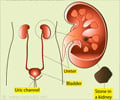
In a research study presented at this year''s Interscience Conference on Antimicrobial Agents and Chemotherapy (ICAAC), a team led by Dr. Dmitri Debabov head of Cell and Microbiology of NovaBay Pharmaceuticals investigated the potential use of a non-antibiotic, anti-infective compound NVC-422. The company uses an in vitro model to mimic a catheterized bladder infected with P. mirabilis resulting in struvite encrustation. NVC-422 was able to inhibit bacterial growth and the resulting struvite formation in these catheterized bladder chambers for up to 144 hours versus saline controls that blocked in 46 hours. Electron microscopy confirmed that these catheters were blocked due to the accumulation of biofilm and struvite.
Dr. Ron Najafi, chairman and CEO of NovaBay, said, "Patients with long-term indwelling bladder catheters often face significant bacterial colonization, causing encrustation and subsequent catheter blockage. Current methods for unblocking these catheters are by mechanical means using a saline solution or by using agents that try to dissolve the struvite crystals. Unfortunately neither method provides satisfactory results."
NovaBay estimates that over 300,000 patients suffering from stroke and multiple sclerosis or spinal cord injuries resulting in quadriplegia or paraplegia use Foley catheters. These patients are at a daily risk for developing catheter-associated urinary tract infections. P. mirabilis can quickly develop a robust biofilm with resulting stone and catheter encrustation. NovaBay''s non-antibiotic, anti-infective deals directly with this and other bacteria inside the bladder without providing opportunity for developing resistance and will maintain catheter patency.
"The research finding suggests that NVC-422 is a potent, fast-acting, broad-spectrum antimicrobial agent that can kill P. mirabilis and thereby inhibit the formation of struvite crystals and subsequent catheter blockage," said Dr. Najafi.
Advertisement









